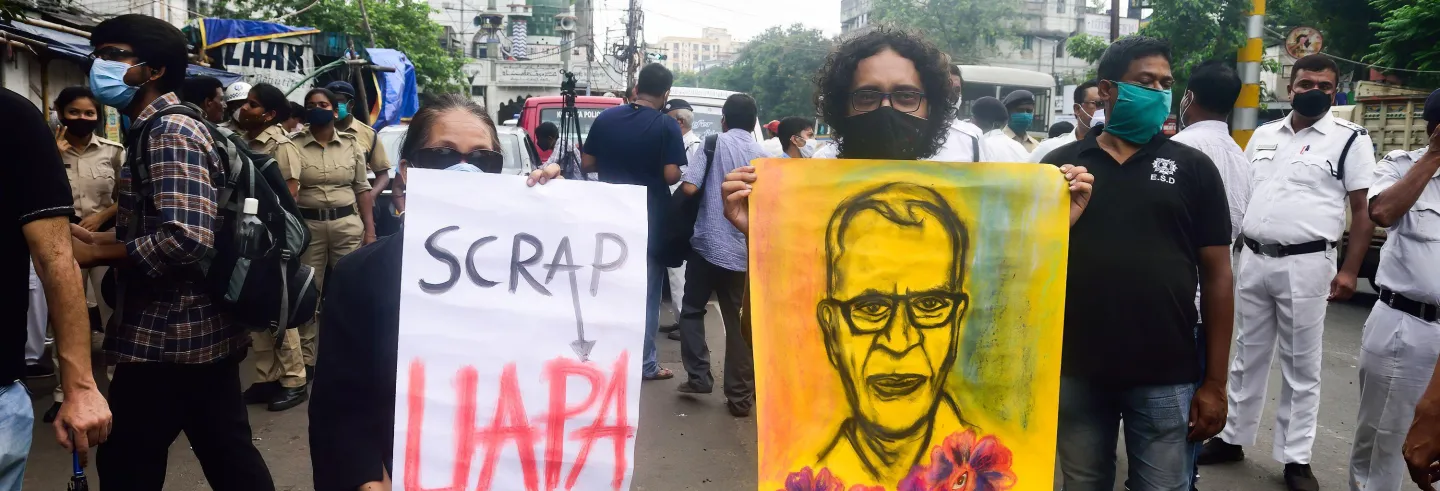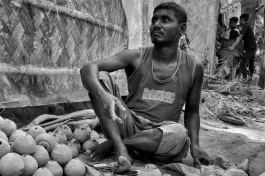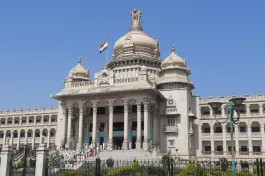Father Stan Swamy’s death in July while in judicial custody was a death he himself had foretold. In a hearing before the Bombay High Court less than a month before he died, he had expressed how his eight-month-long stay in Taloja jail had meant a “steady regression” of his body functions. He then poignantly said that “if this were to go on,” he would “possibly die very shortly.”
"Whatever happens to me, I would like to be with my own."
The institutions of the Indian state, unfortunately, remained silent in the face of the progressive deterioration of the health of Swamy and was deaf to his last wish to ‘be with his own.”
Swamy’s death raises three important issues. Firstly, the failure of the judiciary to note how the steady deterioration of his health was nothing less than deprivation of his right to life under Article 21. Secondly, the judicial failure in not ensuring the right to live with dignity in the final stages of his life. Thirdly, though Swamy is no more, what should be done to ensure justice?
The denial of the right to life
The Indian Constitution does not contemplate judicial silence in the face of the progressive deterioration of the health of a prisoner. The Supreme Court has ruled that ‘fundamental rights do not flee the person as he enters the prison although they may suffer shrinkage necessitated by incarceration.’ The court has also recognised that incarcerated prisoners too have the right to life which includes the “right to live with human dignity.”
Swamy’s statement before the Bombay High Court testifies to how detention led to him losing control over his bodily functions over time, depriving him of his right to live with dignity under Article 21.
Every document which required Swamy’s signature had instead his thumb impression: a mute reminder that the person who was before the court was physically unable to hold a pen long enough even to just sign his name.
Right from the time of Swamy’s arrest, the judicial system was not responsive to the medical fact that older persons face unique challenges during imprisonment. Swamy’s frailties were visible right from his production before an NIA (National Investigating Agency) court in Mumbai in October 2020. Every document which required Swamy’s signature had instead his thumb impression: a mute reminder that the person who was before the court was physically unable to hold a pen long enough even to just sign his name.
The NIA court denied Swamy bail on the ground that “the collective interest of the community would outweigh the right of personal liberty of the applicant” and that Swamy’s old age and “alleged sickness” would not go in his favour. The court failed to appreciate that what was at stake was not the right to personal liberty alone, but also the right to life, which the court was duty-bound to protect.
The statements of the authorities at Taloja jail and JJ Hospital to courts displayed gross medical negligence, providing a wrong picture of Swamy’s heath. The jail authorities said that that Swamy was not “suffering from any illness for which the treatment is not available in the prison” and that he was “hemodynamically stable.” JJ Hospital asserted that many of Swamy’s health parameters were normal. Neither of them tested Swamy for Covid-19 despite him exhibiting symptoms.
The question the Bombay High Court should have asked with a compelling urgency was whether continued detention of Swamy would result in a loss of his life.
Apart from these inaccurate reports, both Taloja jail and JJ Hospital were indifferent to the impact of detention on the health and consequently the right to life of older persons. As the International Committee of the Red Cross puts it, older people face particular health-related challenges in the context of their detention:
The elderly suffer from chronic medical conditions, experience frequent falls, suffer disproportionately from forms of sensory impairment and more. All these complex medical challenges are further exacerbated in a confined environment. Older persons fade difficulties in adapting to the new environment, leading to a greater risk of falls. Prisons often do not have medical care approximating to geriatric care which can respond to the individualised needs of older persons.
Assessed by the community standard of what an older person is entitled to in society, Swamy’s right to health was grossly violated. The rudimentary facilities in Taloja jail, combined with the lack of individualised care which an older person is entitled to receive, told on him. During the eight months of detention, his body was subjected to a process of accelerated ageing.
The question the Bombay High Court should have asked with a compelling urgency was whether continued detention of Swamy would result in a loss of his life. Swamy himself told the court quite categorically that his stay in jail has affected his body and he would likely die as a result.
Could the court have done better? In the case of the detained poet and activist Varavara Rao, the Bombay High Court held that, his continued custody was “incompatible with his health conditions and that sending him back to Taloja Central Prison would amount to endangering his life, thereby violating his fundamental right under Article 21 of the Constitution of India.”
Even then, Varavara Rao was granted bail only after a torturous eight-month-long process. When he fell ill in jail in July 2020, he was admitted to a hospital on the intervention of the NHRC. After little less than a month of treatment, he was “abruptly discharged” and sent back to Taloja jail with “specific instructions” to closely monitor his health. However, the jail failed to follow the instructions, leading to “a sharp deterioration of his health.” After the intervention of the high court, he was readmitted to a hospital. On recovery, the court released him on medical bail in February 2021 for six months.
The Bombay High Court would presumably have followed the same path for Swamy, ordering his release on bail on medical grounds after he had recovered in hospital, on the finding that there was an incompatibility between detention and his right to life.
In the end, Swamy did not have the luxury of time.
The right to die with dignity
The Bombay High Court which understood that the right to health was at stake in Swamy’s case, failed to appreciate that another fundamental right was also at stake: the right to die with dignity. Swamy clearly expressed that the dignity he sought in the final moments, was to ‘be with his own […] whatever happens’.
To deny Swamy the loving relationships that make the difficulties of a complex medical condition bearable was to deny not only his right to health but the right to live with dignity.
The right to dignity in death flows from the constitutional guarantee of privacy. As the Supreme Court put it in its judgement on privacy: ‘Birth and death are events when privacy is required for ensuring dignity amongst all civilized people.’ This was elaborated in a decision on euthanasia where the court held that “decisions relating to death, like those relating to birth, sex, and marriage, are protected by the Constitution by virtue of the right of privacy […] The right to privacy protects autonomy in making decisions related to the intimate domain of death as well as bodily integrity.”
Aged 84, Swamy was in the evening of his life. The only suitable space for palliative care was the home environment that he was used to and not a prison or the sanitized environment of a hospital. Being treated at home is a key dimension of an appropriate standard of care that Swamy was entitled to on account of being an older person. To deny Swamy the loving relationships that make the difficulties of a complex medical condition bearable was to deny not only his right to health but the right to live with dignity.
There must be an inquiry into understanding the causes which led to Swamy’s death and the setting in place of a legal framework to ensure that such injustices do not recur.
If the court had been able to appreciate that older persons with multiple co-morbidities are at additional risk of dying in prison, it would have taken seriously his wish to “be with his own” and released him immediately on medical bail or at the very least ordered home detention. This would have been in line with the Supreme Court’s finding that “in appropriate cases it will be open to courts to order house arrest,” based on “criteria like age, health condition and the antecedents of the accused, the nature of the crime, the need for other forms of custody and the ability to enforce the terms of the house arrest.”
In Swamy’s case, the court only recognised his right to health while turning a blind eye to the possibility that he might die and his consequent right to die with dignity. This was a failure of judgment with grave consequences.
Justice for Father Stan
Reparation, as understood in international law, requires the re-establishment of the situation prior to the violation. Since that is not possible due to the death of Father Stan Swamy, it is necessary to make reparations for his death through other means. Reparation for Swamy must take the form of an acknowledgement and apology by the government of the wrongness of the decision to arrest and detain an 83-year-old ailing man which eight months later resulted in his death.
There must be an inquiry into understanding the causes which led to Swamy’s death and the setting in place of a legal framework to ensure that such injustices do not recur. There is also the need for a judicial acknowledgement of failure in protecting the right to life of Swamy.
The Supreme Court itself has not hesitated to acknowledge judicial errors with grave consequences. The most momentous being the judgment in Puttaswamy v Union of India, where the court acknowledged, that three prior judicial decisions were “discordant notes” in the “evolution of a doctrine” which places “dignity of the individual and freedoms and liberties at the forefront.” The decisions were the denial of habeas corpus rights during the emergency in ADM Jabalpur, the denial of rights to the LGBT community in Suresh Kumar Koushal and holding that preventive detention laws were not subject to the discipline of the right to life under Article 21 in A.K. Gopalan. The Supreme Court has also not hesitated to use the language of apology when grievous wrongs have been committed. In Navtej Singh Johar v Union of India, the court said that “history owes an apology to the members of this community [LGBT] and their families, for the delay in providing redressal for the ignominy and ostracism that they have suffered through the centuries.”
Justice must embody the vital principle of ‘non-recurrence.’ For all older persons, an arrest should be a measure of the last resort and if resorted to at all, it must be home arrest.
There are some indications of a churning. Justice Sambhaji Shiwaji Shinde, one of the judges who heard Swamy’s bail application, said that he attended the funeral of Stan Swamy virtually and that, “We have every respect for his work in the society. Whatever is happening legally is another matter, but we have huge respect for his service to the society.” However after the National Investigation Agency objected to these comments, Justice Shinde said that "I will take it back whatever I said personally. We are also human beings [...] whenever something like this (Swamy's death) happens.”
The court took a step in the direction of apology only to walk back. An apology has to go beyond these tentative steps. The court must acknowledge its failure to comprehend that Swamy’s detention violated not just the right to personal liberty but also the right to life; and that the court failed to ensure his right to die with dignity.
The grave responsibility vested upon the court is to ensure that what happened to Swamy does not happen to other prisoners who are ill and who are older persons. Justice must embody the vital principle of ‘non-recurrence.’ For all older persons, arrest should be a measure of the last resort and if resorted to at all, it must be home arrest. It is only home arrest that will protect the rights of older persons to health, to life, as well as the right to die with dignity, thereby protecting the values of the Constitution.
This is particularly compelling in the case of the other BK-16, the detained sixteen persons in the Bhima Koregaon case, who are in indifferent health and are older persons. The news reports about the ailments of Anand Teltumbde, Sudha Bharadwaj, and Hany Babu and the age of Shoma Sen, Vernon Gonsalves, and Gautam Navalakha should raise alarm bells when it comes to the state’s constitutional responsibility to protect the right to life.
The eventual judgment hopefully will posthumously restore the dignity of Swamy as a citizen committed to the promotion of constitutional values.
The case of the prosecution in the Bhima Koregaon case is based on conjectures. There was no material to substantiate that Swamy was complicit in committing any ‘terrorist act’ as defined in the Unlawful Activities (Prevention) Act, 1967 (UAPA). What the state did was to paint a constitutional concern for the rights of the Adivasis as terrorism. This has damaged the reputation and dignity of Swamy and created a wrongful state manufactured perception of ‘criminality’ around someone who espoused constitutional concerns.
This damage must be remedied through a speedy as well as a just and fair trial of the BK-16. The delay in commencing the trial violated the right of Swamy to a speedy trial, thereby depriving him of the chance to clear his name. Once the trial concludes, the eventual judgment hopefully will posthumously restore the dignity of Swamy as a citizen committed to the promotion of constitutional values.
Swamy symbolised not only a critique of the values promoted by globalisation but also an active espousal of the constitutional value of fraternity.
One of the gravest consequences of globalisation, according to K. Balagopal, is that it has delegitimised a concern for the oppressed. In his concern for the dispossessed, Swamy symbolised not only a critique of the values promoted by globalisation but also an active espousal of the constitutional value of fraternity. He embodied Ambedkar’s (2020 (1952): 484) idea of a “public conscience, […] a conscience which becomes agitated at every wrong; no matter who is the sufferer,” by standing with the Adivasis in their struggle to make the constitutional speak to their concerns of community control over water, forests, and land.
The Constitution which spoke to Swamy was not the ‘liberal’ Constitution that blandly put forward a notion of equality which ‘forbids the rich as well as the poor to sleep under bridges, to beg in the streets and to steal bread'. Rather it was a ‘transformative Constitution’ whose ‘hallmark’ was that it ‘promotes and engenders societal change.’ A transformative constitution from the Adivasi perspective requires that constitutional interpretation centre both the Fifth and Sixth Schedules of the Constitution as well as legislation such as the Panchayat (Extension to Scheduled Areas) Act, 1996 that empowers Gram Sabhas in Adivasi areas to safeguard their cultural identity and exercise control over community resources. The Supreme Court in Samatha v State of Andhra Pradesh embodied such a transformative approach wherein it held that “the Fifth and Sixth Schedules [are] an integral scheme of the Constitution” whose “direction, philosophy and anxiety is to protect the tribals from exploitation” and to “preserve the tribal culture and their holdings.’
The pressure of civil society’s multiple ways of remembering Swamy should shame the state into seeing the wrongness of its actions and ensure public atonement.
It is precisely this transformative approach to the Constitution that Swamy advocated. It should be taken forward as an apt homage to Swamy’s vision, which was fundamentally about guaranteeing Adivasis their collective rights over water, forests, and land. One of the issues he was most involved in before his arrest was the public interest litigation he had filed in the Jharkhand High Court in 2017 on behalf of the thousands of Adivasis who had suffered unjust imprisonment as a result of agitating for their rights. That case should be taken to its logical conclusion.
Memorialising Swamy’s life should be about making his life's work a wider social and political concern. A shared public culture must be built out of the innumerable public events and protests which are taking place, which foregrounds the struggle of the Adivasis for the fulfilment of the Constitution’s promise to them. Out of this public memory should emerge books, films, changes in school and college syllabi, and other actions which take forward the concerns which animated Swamy. The pressure of civil society’s multiple ways of remembering Swamy should shame the state into seeing the wrongness of its actions and ensure public atonement by state officials for its wrongdoing. The state should join civil society in memorialising the life and work of Father Stan Swamy.









